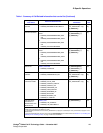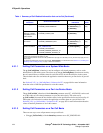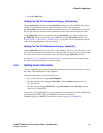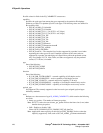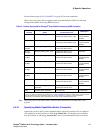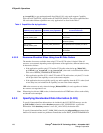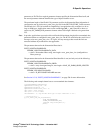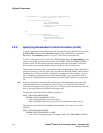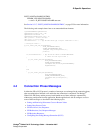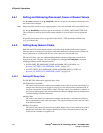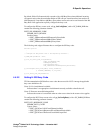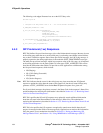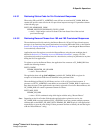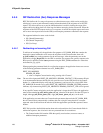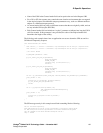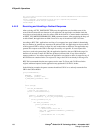Dialogic
®
Global Call IP Technology Guide — November 2007 131
Dialogic Corporation
IP-Specific Operations
IPSET_NONSTANDARDCONTROL
IPPARM_H221NONSTANDARD
• value = IP_H221NONSTANDARD structure
See Section 9.2.17, “IPSET_NONSTANDARDCONTROL”, on page 525 for more information.
The following code example shows how to set nonstandard data elements:
IP_H221NONSTANDARD appH221NonStd;
appH221NonStd.country_code = 181;
appH221NonStd.extension = 31;
appH221NonStd.manufacturer_code = 11;
char* pControl = "Control String";
char* pOid = "1 22 333 4444";
choiceOfNSControl = 1; /* App decides which type of object identifier to use */
/* setting NS Control */
gc_util_insert_parm_ref_ex(&pParmBlock,
IPSET_NONSTANDARDCONTROL,
IPPARM_NONSTANDARDDATA_DATA,
(unsigned long)(strlen(pControl)+1),
pControl);
if (choiceOfNSControl) /* App decide the CHOICE of OBJECTIDENTIFIER.
It cannot set both objid & h221 */
{
gc_util_insert_parm_ref(&pParmBlock,
IPSET_NONSTANDARDCONTROL,
IPPARM_H221NONSTANDARD,
(unsingned char)sizeof(IP_H221NONSTANDARD),
&appH221NonStd);
}
else
{
gc_util_insert_parm_ref(&pParmBlock,
IPSET_NONSTANDARDCONTROL,
IPPARM_NONSTANDARDDATA_OBJID,
(unsingned char)(strlen(pOid)+1),
pOid);
}
4.4 Connection Phase Messages
In either the SIP or H.323 protocol, a number of messages are exchanged in the connection phase,
after one endpoint has initiated a call and before the connection is completed. The Dialogic
®
Global Call API library and the protocol stack handle most of these messages automatically,
without any participation from the application. But the application is able to configure or access
some of these messages as described in the following topics:
• Setting and Retrieving Disconnect Cause or Reason Values
• Setting Busy Reason Codes
• SIP Provisional (1xx) Responses
• SIP Redirection (3xx) Response Messages
• SIP Rejection Responses
• Configuring Proceeding Message Generation (H.323)



